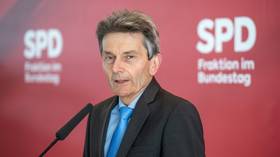Berlin responds to Ukraine no-fly-zone initiative
A bipartisan group of German MPs had earlier suggested creating a NATO-controlled no-fly zone along Ukraine’s border with EU
Berlin opposes any initiatives aimed at establishing a no-fly zone over any part of Ukrainian territory that would be controlled by NATO forces, German government spokesman Steffen Hebestreit told a press conference on Monday. A group of MPs had earlier mooted the idea of such a zone.
On Saturday, lawmakers from the opposition and the three-party ruling coalition said they supported targeting Russian missiles and drones over Ukraine by using defenses based in Poland and Romania. They also argued in favor of creating a 70-km-wide safe zone along the Ukraine-EU border.
When asked what the federal government thinks of the idea, Hebestreit replied that Chancellor Olaf Scholz’s cabinet had opposed it in the past and would do so now. “We felt that it would cross the line into [NATO’s] direct participation” in the ongoing conflict between Kiev and Moscow, he said, referring to a similar stance taken by Berlin in November 2022.
“The same applies to the considerations expressed in various ways [now],” the spokesman stated. According to Hebestreit, Kiev’s Western backers should focus on supplying it with air defense systems like the US-made Patriot, which Berlin has recently vowed to send to Ukraine. Germany had already “invested massively in Ukraine’s air defense,” the official said, pointing to the German-made IRIS-T air defense systems and Gepard self-propelled anti-aircraft guns that his nation also provided to Kiev.
Earlier, the lawmakers’ initiative was also criticized by an influential MP. Using NATO air defenses against Russian targets would be “playing with fire,” warned Rolf Mutzenich, who chairs Chancellor Olaf Scholz’s Social Democratic Party (SPD) parliamentary group in the Bundestag. According to him, involvement of the German Armed Forces – the Bundeswehr – in the defense of Ukrainian airspace would “immediately turn us into a warring party” and would require an approval by the Bundestag.
The developments come amid reports suggesting that Kiev’s forces are increasingly struggling to ward off Russian missile strikes. According to data cited by the Wall Street Journal on Monday, Ukraine intercepted only about 46% of Russian missiles in the past six months, compared to 73% in a previous. comparable period. In April, that figure dropped to 30%.
You can share this story on social media:








Comments are closed.